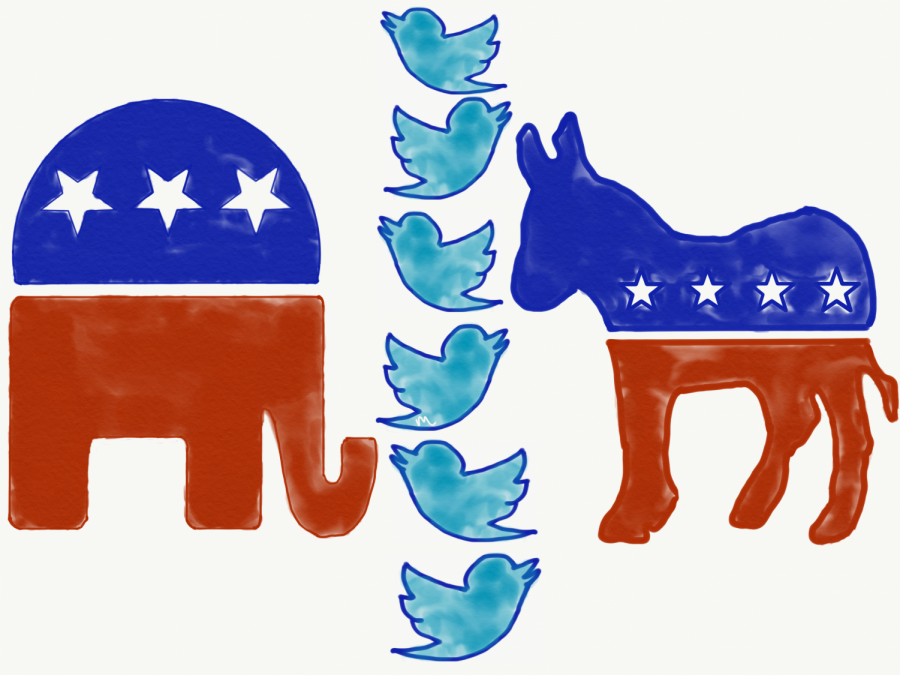Column: Political discourse on social media continues to divide society
Illustration by Madison Boudreau Popovic
Social media polarizes society through political posts.
October 1, 2021
From standing up for tax reform to social and racial justice, there’s a time and place for it all. In recent years, politics began to infiltrate aspects of society where it never belonged. This, in turn, promotes the spread of negativity and toxicity worldwide. It appears that no one can escape politics, no matter where they turn.
Social media became a popular platform for politicians to post about politics. Politicians from both sides of the political aisle, such as Rep. Alexandria Ocasio-Cortez and Sen. Ted Cruz, tend to use Twitter to post about their beliefs in order to reach voters. This isn’t just exclusive to politicians, as celebrities also take to social media to “inspire change.” During the most recent presidential election, celebrities, such as Ariana Grande, flocked to social media to encourage people to vote. However, posts by influential people about politics actually don’t do much to influence voters.
To be quite honest, there are many people who aren’t fortunate enough to have access to such platforms. In a Pew Research Center survey from 2021, 24% of adults in the U.S. who make less than $30,000 a year don’t have smartphones. On top of this, 41% of households considered to be lower income in the United States don’t have laptops or desktop computers. So for politicians and celebrities who continue to try reaching society through social media, they’re only reaching those who are incredibly privileged. To put this in perspective, over 223 million Americans used social media in 2020. At that time, the population of the United States was 331,449,281 people.
In fact, those privileged individuals who use social media don’t wish to see any political content on their feeds. Fifty-five percent of U.S. adult social media users in a Pew Research Center survey from 2020 claim they’re tired of political posts. Nowadays, social media acts as a dividing medium rather than a medium where users can make or maintain genuine connections, despite what it was originally intended for.
Facebook founder Mark Zuckerberg created Facebook while attending Harvard for the purpose of connecting with people, which he said was lacking on the internet.
“You could find music; you could find news; you could find information, but you couldn’t find and connect with the people that you cared about, which as people is actually the most important thing. So that seemed like a pretty big hole that needed to get filled,” Zuckerberg said, in an interview with Freakonomics Radio.
With all of this politicization comes a spread of negative feelings. I feel like we are more divided as a nation than ever before, and it may be because of people sharing their beliefs in the wrong place, at the wrong time, out of what appears to be convenience, instead of sparking real change through attending a protest or contacting legislators to help pass bills. Despite this, some think it’s acceptable and actually a good thing. For instance, 15% to 20% of participants in the same Pew Research Center survey from 2020 like seeing political posts on social media. I said it last year, and I’ll say it again, it’s sad how divided society is and continues to be because of politics on social media platforms.
It’s great to stand up for what you believe in, but we must remain mature and realize that the statements made by people like Ocasio-Cortez and Cruz don’t belong on Twitter. They belong at protests and in the halls of Congress. They belong where real change can occur. Northeastern students and staff must do their part in this by not always running to social media to make a political statement. After a while, people will stop listening and view it as white noise. We should channel our energy and passion for politics into action that could create real change, such as signing petitions, donating money toward causes you believe in, volunteering for political leaders or organizing/attending protests.
Madison Boudreau Popovic is a second-year political science and business administration combined major with a minor in French and Opinion Editor of The News. She can be reached at popovic.m@northeastern.edu.







